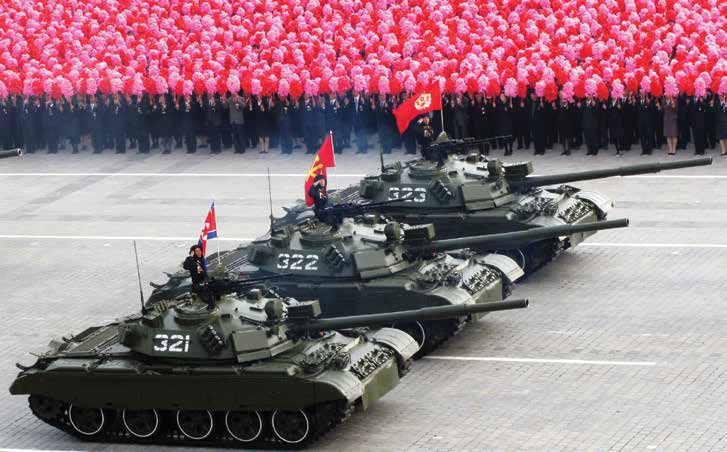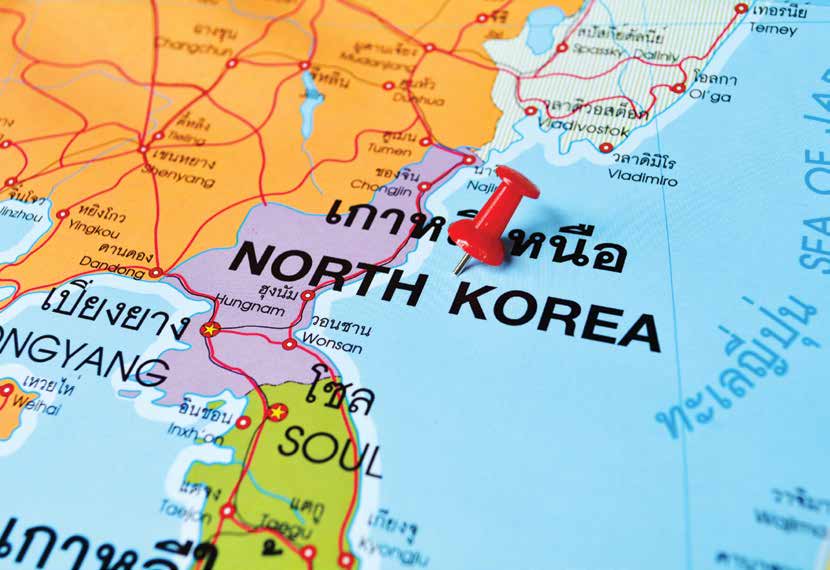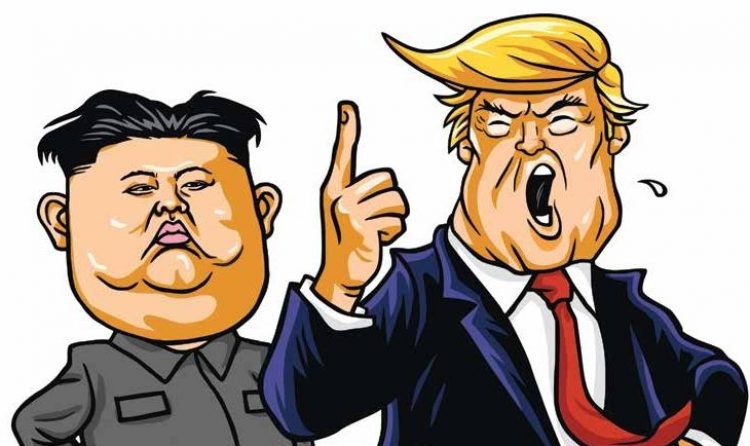In his latest column for IAG in which he examines the broader political climate around Asia, Dr Peter T Treadway explains why US President Donald Trump has got it all wrong in his approach to North Korea.
The amazing things about Senator Graham’s words are the inaccuracy and the implicit racism of these remarks. The comments were based on a conversation with President Trump in which, according to Senator Graham, Trump implied that he was considering a nuclear strike on North Korea. The inaccuracy lies in the fact that millions, not thousands, are likely be killed. The implicit racism is quite evident – it’s OK that millions die since they would be Asians “over there.” Thus, the United States would follow up its killing of two to three million Koreans in the Korean War, a deed about which the commander of the American Air Force, Curtis LeMay, took responsibility and actually bragged.
Such an attack would bring about a huge drop in the world stock markets. But saying this trivializes the event. This attack might evoke a Chinese intervention of some sort leading to a major conflict with the United States. And it would be regarded in racial terms as an attack against Asia. North Korea could become another Sarajevo and Kim Jong-un the spiritual heir to Archduke Francis Ferdinand.
The US and China must convince Kim Jong-un that regime change is not the objective. Secretary of State Rex Tillerson did say this last week, although there are a gaggle of Americans including the Wall Street Journal saying otherwise. The US must negotiate with North Korea and with China on this. Sanctions alone are not likely to work. The North Korean government will likely blame the Americans for any hardships visited upon its populace and the populace will believe it. At the very least, the North Koreans should simultaneously be offered a carrot along with the sanctions stick.
Intersecting this crisis is a major underlying phenomenon – the rise of China. Implicitly, China has its own “Monroe Doctrine.” That means, the Americans should retreat from Asia which is rightfully a Chinese concern. Regardless of what the Chinese say in public, they may feel a nuclear North Korea “pulling the American chain” is in their interest. They don’t want a North Korean collapse and they don’t want American troops on their border. As MacArthur discovered. They don’t believe, as don’t most other sober observers, that Kim Jong-un is really intending to attack the United States. They think that the North Korean missile/nuke program is a massive geopolitical publicity stunt designed to prevent regime change.
Why should China help the United States? The United States is threatening trade sanctions against China and limiting Chinese purchases of American companies. The US treats China like an enemy. Still, is Chinese President Xi Jinping making a serious error by calling Trump’s bluff on this? Domestically, he may be being held up to Mao’s example.
Mao risked a nuclear attack on China when he ordered Chinese troops into the Korean civil war. He guessed right that Truman would not pull the nuclear trigger. Mao and Truman made the right decisions. Will Trump?

This crisis is as much about US-China relations as it is about North Korea. Historically, when China was strong, Korea was a tributary state of China. This tributary relationship existed in one form or another from the Chinese Tang Dynasty in the seventh century until the Sino-Japanese War in 1894. If China really wanted North Korea to stop its missile program, North Korea would stop.
China’s behavior on this thus far resembles that of the US after WWI. The US had emerged as the world’s most powerful country but it was not yet ready to take on the task of global hegemon which it did effectively do after WWII. The US did not join the League of Nations and let the Europeans punish Germany, thus setting the stage for WWII. Hopefully, China will realize that it is in its interest to take care of this North Korean problem and keep the Americans from doing something reckless.
The US argues that it is running a large trade deficit with China and therefore doing China some kind of favor. China should reciprocate by leaning on North Korea. China might argue with some justification that the US isn’t doing China any favors since the USChina trading relationship is immensely favorable to both. And the US owes China a lot of money.
These economic arguments ignore a basic point. The US and China are now joined at the hip economically and neither can afford to break this relationship. Nobody’s doing anybody any favors.
One thing that might make China more agreeable right now is its major border problem with India in a place called Doklam, which is located between Bhutan and Northeast India. Chinese and Indian troops are reportedly eyeball to eyeball. The US has been quiet on this, not overtly taking India’s side as might be expected. Is this some way for the US to ingratiate itself with China or is this just an obscure conflict that the understaffed Trump State Department hasn’t gotten around to?
America will sooner or later have to accept China as CO-EQUAL in Asia
The Chinese economy, imperfect misallocator of capital as it may be, is growing at a rate three times faster than the US. The Chinese military is rapidly improving its capabilities along with it. On a GDP per capita basis, China is leagues behind the United States. But there are 1.4 billion Chinese and only 326 million Americans. The Chinese population is known for its tendency to work hard, for its lack of sectarian and religious divisions and for its acquisitiveness – all qualities which offset China’s sub-optimal economic policies. The Chinese have a plethora of “land-based” aircraft carriers. They are called airfields and they are along the coast. China’s got the home court advantage. All this is being noticed throughout Asia.
The United States, the global and Asian hegemon since 1945, is being challenged by a new player – China. The last time such a challenge arose was when an emerging Germany challenged the mighty British (and French) Empire – we all know how that turned out.
After WWII, the US succeeded the war-bankrupted UK as global hegemon. This was a relatively painless transition since the US shared the same democratic values as the UK. But the US and China do not share the same values. The core US value is freedom and the rights of the individual. The core Chinese value is Confucian order and obedience. Freedom of speech, so important for internet social media, is a US tradition totally absent in China.
Both nations have superiority complexes. The US, with its 250- year history, considers itself an “exceptional” country with a mission to promote its democratic values throughout the world. Thus, a large number of Americans think it’s their moral duty to demand regime change in “evil” North Korea.
China, with a 5,000-year history, considers itself an “exceptional” country with the expectation that its neighbors will render it proper respect and imitate its culture and system. It doesn’t think of itself as the new player on the Asian scene. Rather for the last 1,000 years it has considered itself the rightful East Asian hegemon. Its neighbors including Korea regularly rendered tribute to the Son of Heaven, as the Chinese emperor was called. The country calls itself “The Middle Kingdom,” meaning center of the world. It believes the South China Sea is, as its name implies, Chinese. It regards 1840-1949, when it was weak and pushed around by the Western powers and Japan, as an anomaly and a humiliation never to be repeated.

Wilbur Ross – stick to steel!
The United States’ technological dominance is the major source of its power. It is no surprise China is trying to catch up to the US and excel in this area. The US and the world will benefit from Chinese competition and the additional Chinese minds solving problems.
Keeping China backward is a losing strategy doomed to failure and the creation of resentment.
Rather than China, a major threat to America’s technological dominance is Wilbur Ross and his band of troglodyte anti-immigrant zero-sum-game protectionists. The argument against American protectionism is simple: the Chinese top-down, protectionist East Asian model is inferior to the global American free market model. So why should America imitate the Chinese model? The United States should stick to its free market open model to stay ahead of a larger China.
The Wilbur Ross quote cited above reflects a very backward view of the semiconductor situation. China has announced it will pour US$130 billion into memory chips. Another great leap forward? China will have to buy the manufacturing equipment, hire the engineers and pay for the patents, all from the West. Making semiconductors isn’t as simple as making sneakers. All the while the Western companies will be advancing.
Furthermore, why isn’t the Trump Administration loosening American immigration so as to allow the best and the brightest to work in America? The latest Trump immigration proposal is an antiimmigration wolf in sheep’s clothing. While it has some good points including an emphasis on talented people, it proposes to cut legal immigration by 50%.
Luckily, the US doesn’t have a monopoly on dumb policies. China is intensifying its own Great Internet Firewall around the country by eliminating access to virtual private networks (VPNs). VPNs were a major vehicle to get around Chinese censorship of foreign websites. Access to the global internet is scheduled to be completely cut off. China is deliberately ensuring that no top scientists, including those educated in the US, will want to work there.
You would think the US would regard this as an and make it easy for unhappy Chinese scientists to come to the US. After the 1989 Tiananmen Square incident, both by Executive Order and later by legislation, Chinese students studying in the US were allowed to stay and acquire citizenship. But no, the US is effectively turning down a gift! The Trump Administration apparently doesn’t like foreigners (unless they work for low wages at one of the President’s golf clubs). The US could be recruiting the best and the brightest all over the world including the many Chinese scientists and engineers who are graduating from American schools. Canada has figured this out and is recruiting scientists and engineers that might have gone to the US. Oh Canada.
While supporting Trump’s plans to lower taxes, roll back regulations and reform Obamacare, I have written extensively against Trump’s dark side – his retarded mercantilist approach to international trade and globalization. The number one object of this wrath seems to be China. So he wants China to help with North Korea?




























